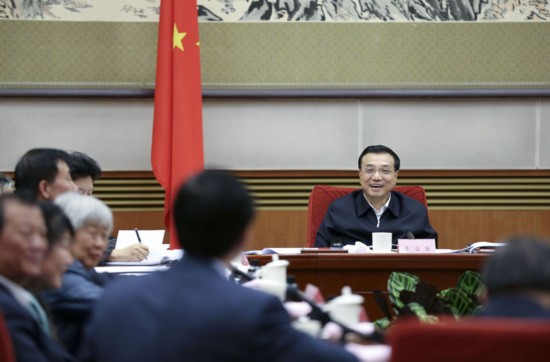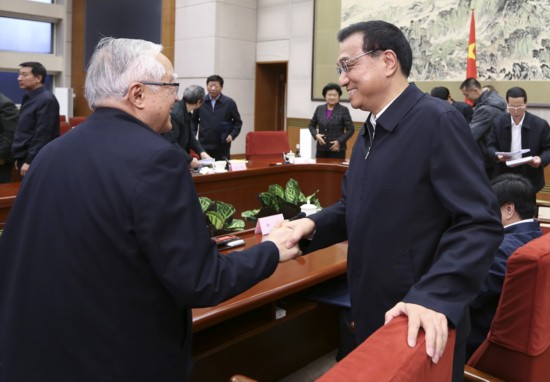Li Keqiang: Mass entrepreneurship and innovation are the new engines of China’s economy.

On the afternoon of January 26th, Li Keqiang, Premier of the State Council of the People’s Republic of China hosted a forum to listen to the opinions and suggestions of experts, scholars and business people on the Government Work Report.

On the afternoon of January 26th, Li Keqiang, Premier of the State Council of the People’s Republic of China hosted a forum to listen to the opinions and suggestions of experts, scholars and business people on the Government Work Report.
Beijing, January 27th (Reporter Feng Yue) According to the Voice of China News and Newspaper Summary, Li Keqiang, Premier of the State Council of the People’s Republic of China hosted a forum yesterday to listen to the opinions and suggestions of experts, scholars and business people on the Government Work Report. The State Council Vice Premier Zhang Gaoli attended the forum.
At the symposium, experts and scholars from universities, scientific research institutions and financial institutions expressed their opinions on the current economic situation. Business leaders from the Internet, electronic information, venture capital, building materials and other industries discussed their views on industry development and economic trends respectively. Li Keqiang said: "While stabilizing macro-policies, we focus on interval control and directional control. In fact, in the past two years, the most important indicator we have adopted is to stick to the employment rate. We are most pleased that employment has increased by 13 million people, which is very important for a developing country. "
Faced with the current slowdown in growth and difficulties in the operation of some enterprises, experts suggest that structural reforms should be used to solve structural contradictions, and high-end industries such as modern service industries should be developed to improve economic efficiency. Li Keqiang said: "When we enter the new normal, we can’t pursue higher speed, but we should put more energy into improving quality and efficiency. We talk about a stable macroeconomic policy to ensure that in a reasonable range, we always grasp it in this process and use more energy to promote comprehensive deepening reforms and promote structural reforms. "
Tsinghua University, Wu Xiaoling and others proposed to implement a moderately tight monetary policy, accelerate financial reform and stabilize market expectations. Li Keqiang said: "What Comrade Wu Xiaoling said gives us a good inspiration. We always talk about relaxing access to finance on the one hand and strengthening supervision on the other. In fact, many aspects of our financial supervision are unnecessary or even should not be. In this respect, it just hinders market access. Our government has to do the government’s business. We always give orders to the market and always take enterprises to plan, but the government has done nothing of its own. Think about it, some of what we say should not be, some may be empty talk, and it may be meaningful to give a signal at most. The operation of enterprises should be planned by themselves, so we should concentrate on doing the government’s things well. "
At the symposium, several entrepreneurs put forward suggestions on encouraging innovation, developing venture finance, promoting enterprises to "go global" and reforming state-owned enterprises. Li Keqiang emphasized: "How can we let the masses start businesses and innovate? I think this is a new engine of China economy. If 120 million people can start businesses and innovate, what changes will this bring to our entire economic structure? If we say that in the first 30 years (reform and opening up), we relied more on hard work, and then we should rely more on wisdom, relying on the government to simplify administration and decentralize power, lowering the market entry threshold, so that people who are willing to start businesses can start businesses, and then strengthen supervision after the event in the market. If we say that mass entrepreneurship and innovation are mobilized, this requires government reform. "